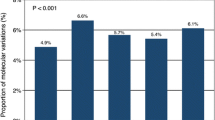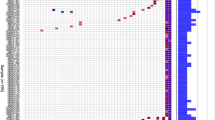Abstract
Background
To date, no predictive biomarker for the efficacy of FOLFIRINOX in metastatic pancreatic adenocarcinoma has been demonstrated. Deficiency in O6-methylguanine-DNA methyltransferase (MGMT) has been associated with a therapeutic response in endocrine tumors of the pancreas and the lack of expression of protein 53 (p53) could interfere with the action of MGMT.
Objective
The aim of our study was to assess the prevalence of MGMT and p53 in patients with metastatic pancreatic adenocarcinoma treated with FOLFIRINOX as a first-line treatment and to investigate their association with therapeutic response and survival.
Patients and Methods
The immunohistochemical expression of MGMT was recorded as present or absent and the expression of p53 was semi-quantitatively scored in 30 patients with metastatic pancreatic adenocarcinoma, at Angers Hospital in France between September 2011 and June 2015. Clinical and radiologic data were collected retrospectively.
Results
The presence or absence of MGMT expression entailed no significant differences in response rate. Median values of progression-free survival (PFS) and overall survival (OS) were lower in patients with MGMT expression, but sample size is too small to conclude that there is a statistically significant difference. No significant relationship for response rate and PFS was observed in relation with p53 expression. By contrast, patients with a strong tumor expression of p53 had a significantly lower OS compared to patients with no or weak expression of the protein (p = 0.027). There was a positive correlation between the expression of p53 and MGMT (p = 0.08).
Conclusions
These preliminary findings suggest that for patients treated with FOLFIRINOX as a first-line treatment for metastatic pancreatic adenocarcinoma, the immunohistochemical evaluation of MGMT could not predict the clinical outcome; however, the survival was not significant probably because of the under-powered study (due to small sample size). A strong tumor expression of p53 is associated with a poor prognosis of OS.




Similar content being viewed by others
References
Conroy T, Desseigne F, Ychou M, Groupe Tumeurs Digestives of Unicancer, PRODIGE Intergroup, et al. FOLFIRINOX versus gemcitabine for metastatic pancreatic cancer. N Engl J Med. 2011;364:1817–25.
Spratlin JL, Mulder KE. Looking to the future: biomarkers in the management of pancreatic adenocarcinoma. Int J Mol Sci. 2011;12:5895–907.
Konecny GE, Kristeleit RS. PARP inhibitors for BRCA1/2-mutated and sporadic ovarian cancer: current practice and future directions. Br J Cancer. 2016;115:1157–73.
Esteller M, Hamilton SR, Burger PC, et al. Inactivation of DNA repair gene O6-methylguanine-DNA methyltransferase by promoter hypermethylation is a common event in primary human neoplasia. Cancer Res. 1999;59:793–7.
Sabharwal A, Middleton MR. Exploiting the role of O6-methylguanine-DNA methyltransferase (MGMT) in cancer therapy. Curr Opin Pharmacol. 2006;6:355–63.
Kokkinakis DM, Ahmed MM, Delgado R, et al. Role of O6-methylguanine-DNA methyltransferase in the resistance of pancreatic tumors to DNA alkylating agents. Cancer Res. 1997;57:5360–8.
Kulke MH, Hornick JL, Frauenhoffer C, et al. O6-methylguanine ADN methyltransferase deficiency and response to temozolomide-based therapy in patients with neuroendocrine tumors. Clin cancer Res. 2009;15:338–45.
Hegi ME, Diserens AC, Gorlia T, et al. MGMT gene silencing and benefit from temozolomide in glioblastoma. N Eng J Med. 2005;352:997–1003.
Kuo CC, Liu JF, Chang JY. DNA repair enzyme, o6-metghylguanine DNA methyltransferase, modulates cytotoxicity of camptothecin-derived topoisomerase I inhibitors. J Pharmacol Exp Ther. 2006;316:946–54.
Damia G, Imperatori L, Citti L, et al. 3-methyladenine-DNA-glycosylase and O6-alkyl-guanine-DNA-alkyltransferase activities and sensitivity to alkylating agents in human cancer cell lines. Br J Cancer. 1996;73:861–5.
D’Atri S, Graziani G, Lacal PM, et al. Attenuation of O6-methylguanine-DNA mathyltransferase activity and mRNA levels by cisplatin and temozolomide in jurkat cells. J Pharmacol Exp Ther. 2000;294:664–71.
Tanaka S, Kobayashi I, Utsuki S, et al. Down regulation of o6-methylguanine methyltransferase gene expression in gliomas by platinium compounds. Oncol Rep. 2005;14:1275–80.
Murakami J, Lee Y-J, Kokeguchi S, et al. Depletion of O6-methylguanine-DNA methyltransferase by O6-benzylguanine enhances 5-FU cytotoxicity in colon and oral cancer cell lines. Oncol Rep. 2007;17:1461–7.
Levine AJ. p53, the cellular gatekeeper for growth and division. Cell. 1997;88:323–31.
Hengstler JG, Tanner B, Möller L, Kaina B. Activity of O6-methylguanine-DNA methyltransferase in relation to p53 status and therapeutic response in ovarian cancer. Int J Cancer. 1999;84(4):388–95.
Rolhion C, Penault-Llorca F, Kemeny JL, et al. O6-methylguanine-DNA methyltransferase (MGMT) expression in human glioblastomas in relation to patient characteristics and p53 accumulation. Int J Cancer. 1999;84:416–20.
Gupta S, Sathishkumar S, Ahmed MM. Influence of cell cycle checkpoints and p53 function on the toxicity of temozolomide in human pancreatic cancer cells. Pancreatology. 2010;10:565–79.
Munro AJ, Lain S, Lane DP. P53 abnormalities and outcome in colorectal cancer: a systematic review. Br J Cancer. 2005;92(3):434–44. doi:10.1038/sj.bjc.6602358.
Kruger S, Haas M, Ormanns F, et al. Translational research in pancreatic ductal adenocarcinoma: current evidence and future concepts. World J Gastroenterol. 2014;20:10769–77.
Allan JM, Travis LB. Mechanisms of therapy-related carcinogenesis. Nat Rev Cancer. 2005;5:943–55.
Walter T, van Brakel B, Vercherat C, et al. O6-Methylguanine-DNA methyltransferase status in neuroendocrine tumours: prognostic relevance and association with response to alkylating agents. BJC. 2015;112:253–531.
Konduri SD, Ticku J, Bobustuc C, et al. Blockade of MGMT expression by o6 benzyl guanine leads to inhibition of pancreatic cancer growth and induction of apoptosis. Clin Cancer Res. 2009;15:6087–95.
Maple JT, Smyrk TC, Boardman LA, et al. Defective DNA mismatch repair in long term (≥3 years) survivors with pancreatic cancer. Pancreatology. 2005;5:220–7.
Dong X, Li Y, Hess KR, et al. DNA mismatch repair gene polymorphisms affect survival in pancreatic cancer. Oncologist. 2011;16:61–70.
Miyazaki K, Yakushiji H, Ogawa A, et al. Expression and prognostic significance of o6-methylguanine-DNA methyltransferase in hepatocellular, gastric and breast cancers. Ann Surg Oncol. 2001;8:807–16.
Chen HS, Kuo CC, Li CF, et al. O6-methylguanine DNA methyltransferase repairs platinum-DNA adducts following cisplatin treatment and predicts prognoses of nasopharyngeal carcinoma. Int J Cancer. 2015;137:1291–305.
Fiorini C, Cordani M, Padroni C, et al. utant p53 stimulates chemoresistance of pancreatic adenocarcinoma cells to gemcitabine. Biochim Biophys Acta. 2015;1853:89–100.
Ardito CM, Grüner BM, Takeuchi KK, et al. EGF receptor is required for KRAS-induced pancreatic tumorigenesis. Cancer Cell. 2012;22:304617.
Esteller M, Herman JG. Generating mutations but providing chemosensitivity: the role of o6-methylguanine DNA methyltransferase in human cancer. Oncogen. 2004;23:1–8.
Hohla F, Hopfinger G, Romeder F, et al. Female gender may predict response to FOLFIRINOX in patients with unresectable pancreatic cancer: a single institution retrospective review. Int J Oncol. 2014;44:319–26.
Ormanns S, Siveke JT, Heinemann V, et al. pERK, p AKT and p 53 as tissue biomarkers in erlotinib-treated patients with advanced pancreatic cancer: a translational subgroup analysis from AIO-PK0104. BMC Cancer. 2014;14:624.
Na-Hye Myong. Role of loss O6-methylguanine DNA methyltransferase (MGMT) expression in non-small cell lung carcinomas (NSCLCs): with reference to the relationship with p53 overexpression. Cancer Res Treat. 2010;42(2):95–100.
Koga Y, Kitajima Y, Miyoshi A, et al. Tumor progression through epigenetic gene silencing of o6-methylguanine-DNA-methyltransferase in human biliary tract cancers. Ann Surg Oncol. 2005;12:354–63.
Osanai T, Takagi Y, Toriya Y, et al. Inverse correlation between the expression of O6-methylguanine-DNA methyl transferase (MGMT) and p53 in breast cancer. Jpn J Clin Oncol. 2005;35(3):121–5. doi:10.1093/jjco/hyi036.
House MG, Herman JG, Guo MZ, et al. Aberrant hypermethylation of tumor suppressor genes in pancreatic endocrine neoplasms. Ann Surg. 2003;238(3):423–31.
Wu PF, Kuo KT, Kuo LT, et al. O6-methyguanine-DNA methyltransferase expression and prognostic value in brain metastases of lung cancers. Lung Cancer. 2010;68(3):484–90.
Christmann M, Verbeek B, Ross WP, Kaina B. O6-methyguanine-DNA methyltransferase (MGMT) in normal tissues and tumors: enzyme activity, promoter methylation and immunohistochemistry. Biochimica Biophysica Acta. 2011;1816(2):179–90.
El-Deiry WS, Vijayvergia N, Xiu J, et al. Molecular profiling of 6,892 colorectal cancer samples suggests different possible treatment options specific to metastatic sites. Cancer Biol Therapy. 2015;16(12):1726–37.
Ruggeri BA, Huang L, Berger D, et al. Molecular pathology of primary and metastatic ductal pancreatic lesions: analyses of mutations and expression of the p53, mdm-2 and p21/WAF-1 genes in sporadic and familial lesions. Cancer. 1997;79(4):700–16.
Author information
Authors and Affiliations
Corresponding author
Ethics declarations
Funding
No source of funding was used to conduct this study.
Conflict of interest
Carole Vitellius, Caroline Eymerit-Morin, Dominique Luet, Lionel Fizanne, Fanny Foubert, Sandrine Bertrais, Marie-Christine Rousselet and François-Xavier Caroli-Bosc have no conflict of interest.
Ethics approval
Our study has been approved by Ethical committee of Angers hospital (Number 2016/123).
Informed consent
Informed consents of patients were not required (majority of patients died).
Rights and permissions
About this article
Cite this article
Vitellius, C., Eymerit-Morin, C., Luet, D. et al. Relationship Between the Expression of O6-Methylguanine-DNA Methyltransferase (MGMT) and p53, and the Clinical Response in Metastatic Pancreatic Adenocarcinoma Treated with FOLFIRINOX. Clin Drug Investig 37, 669–677 (2017). https://doi.org/10.1007/s40261-017-0522-3
Published:
Issue Date:
DOI: https://doi.org/10.1007/s40261-017-0522-3




